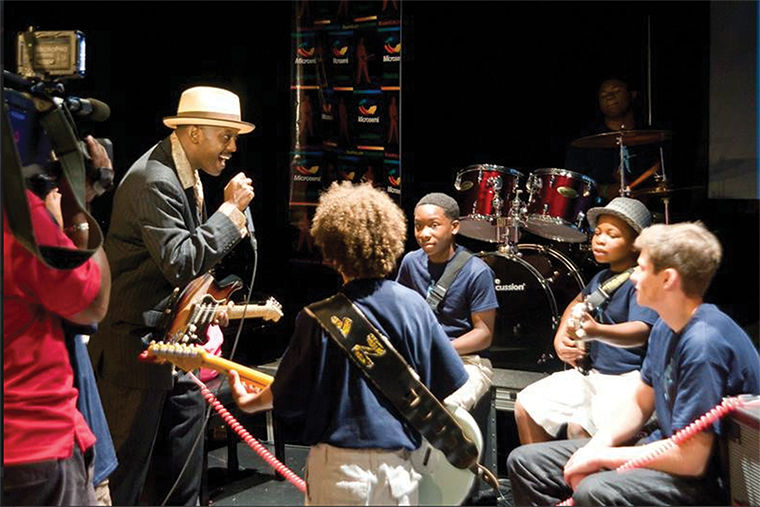Professor brings blues to American youth
Fernando Jones, who is pictured above performing with a group of students at the camp, said that the Blues Camp is the crown jewel of the Blues Kids of America brand.
March 2, 2015
When Fernando Jones, an adjunct professor in the college’s Music Department, founded Blues Kids of America in 1989, he envisioned a program in which student musicians could gather to play music they love.
More than two decades later, Jones’ vision is a reality. The organization’s Blues Camp, now entering its fifth year, provides students ages 12–18 the opportunity to gather for a week of blues instruction, performances and fun.
Jones started the first camp at Columbia in 2010. A dream of his since his childhood, Jones wanted to create a program that promotes the blues genre to American youth, he said. Now, Jones has camps in locations across the U.S., as well as international locations in London and Rome.
Students are selected for the program through an audition process, which takes place at least 60 days before the camp starts. It is a competitive process with approximately 200 spots available for students and other applicants interested in the program, Jones said.
At the camp, students are immersed in blues music, which means they are attending classes, rehearsals and preparing for their own performances. Students benefit from being around like-minded musicians, said Daniel Peetz, a senior music major and summer intern at the Blues Camp.
“It’s pretty incredible to see 9-, 10-, 12-year-olds that share that passion,” Peetz said. “When you’re [that age] you don’t really get the chance to explore this genre because it’s not on the radio.”
Peetz said the camp often helps introverted students come out of their shell and that the program offers students an opportunity to showcase their talent to friends and family at their final performance at the end of the camp.
“By the end of the week, you see the shyest kids on the first day [act like] a superstar on the last day,” Peetz said. “They’re tapping their feet, playing with their eyes closed. They’re really feeling the music. You see a flower blossom.”
Jones, whose career in blues music ranges from performing to producing, said he is a strong believer in promoting music education. Citing the multiple intelligence theory, first introduced by neurologist Dr. Howard Gardner, Jones said music education is important because everyone learns differently, and music is a form of intelligence.
“When you introduce music to people in a formal situation, oftentimes it’s easy to gravitate toward it because it is in them already,” Jones said. “People learn differently, and [music] can give them an opportunity to express themselves.”
Jones’ work with Blues Kids has attracted the attention of music fans and organizations across the country. Gary Matts, president of the Chicago Federation of Musicians, shares Jones’ view of blues music education, which is one of the reasons the organization supports sponsoring the camps.
“We think encouraging the continuation of this art form is something that’s important,” Matts said. “[It’s important] that young musicians who have an attraction to this kind of music have an opportunity to be a part of this camp.”
Matts also said blues music is an important part of Chicago’s musical heritage that transcends racial, economic and international boundaries. According to Jones, this is something on which the organization hopes to capitalize in the future, with plans to expand the camps to Brazil, Venice, and to areas of the Middle East.
“It’s a contribution from America to the world that is not political,” Jones said. “We look at it as being a language. We want it to be almost an ambassadorial tool of good will.”
The Blues Kids of America student musicians are set to kick off this year’s Chicago Blues Festival, the largest free blues festival in the world, on June 12–14.








